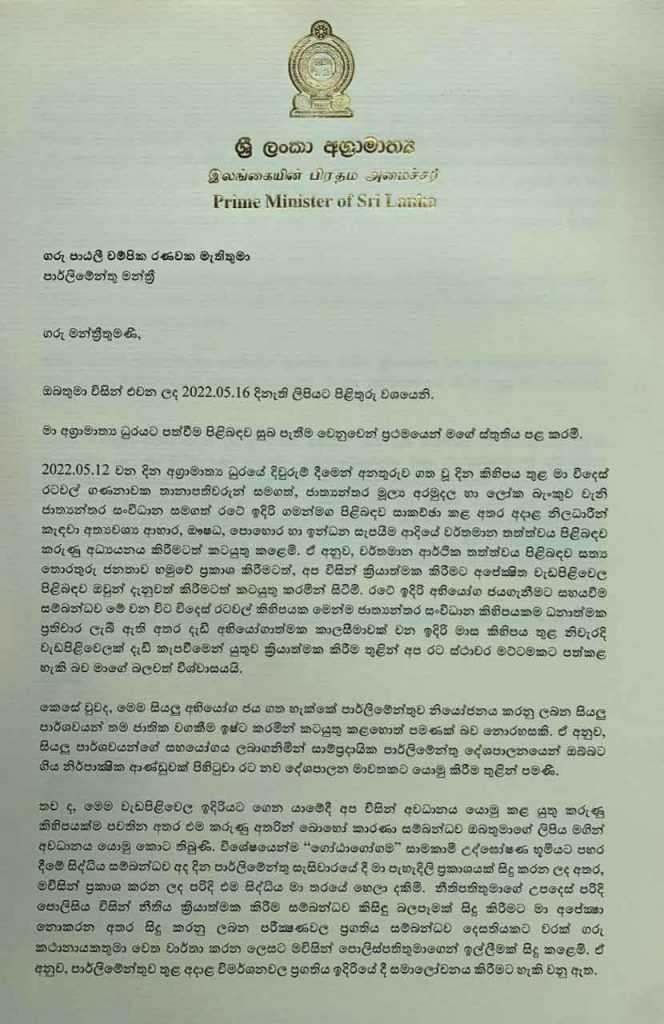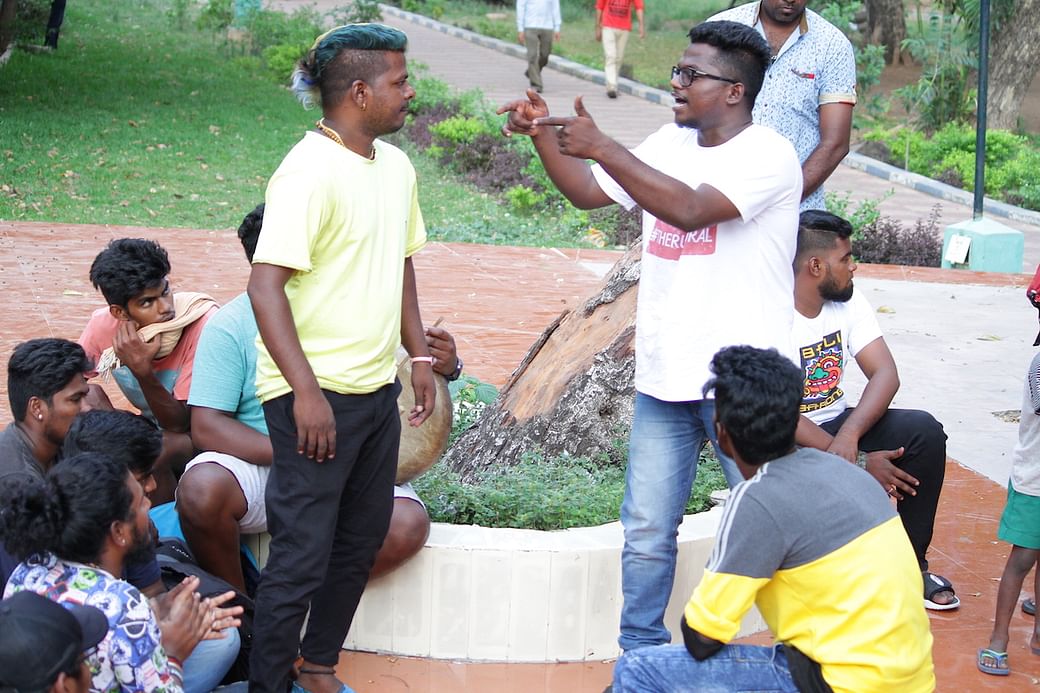The Lanka Indian Oil Company (IOC) said the reports on the company increasing fuel prices from today (18) are completely false.
MIAP
The Lanka Indian Oil Company (IOC) said the reports on the company increasing fuel prices from today (18) are completely false.
MIAP
Ruling Party MPs Sanath Nishantha and Milan Jayathilake, former Provincial Council Member Amal Silva and Dehiwala-Mount Lavinia Urban Council worker Subhash Fernando, who were arrested in alleged connection to the brutal assault launched on the peaceful protests held in front of Temple Trees and Galleface, Colombo on May 09 were remanded till May 25, as per the order of Fort Magistrate Thilina Gamage.
This was when the suspects were produced before the Court today (18).
In consideration of the facts, evidence and statements collected from all the parties, the Court denied the suspects’ bail application given the possibility of inciting public disturbance upon any granting of bail amidst the ongoing investigations and that the injured are still in medical care.
Considering the request for an appropriate order ensuring the security of MPs, the Magistrate directed the Commissioner General of Prisons to take appropriate measures regarding their safety and to ensure that they attend the Parliament sittings.
The prison officials were ordered to produce both former Provincial Council Member Silva and Worker of the Dehiwala – Mount Lavinia Council Fernando for an ID parade with masks on the next day. The Magistrate also noted that the Court observes that the suspects should act more responsibly as MPs.
Shavendra Fernando PC appearing for the suspects objected to the holding of an ID parade stating that despite the suspects being covered with masks their photographs were shown on the media, which would be ‘prejudicial’ to the suspects, thereby urging the Court to cancel the holding of an ID parade. Amal Silva’s name was mentioned by the CID publicly, Fernando PC noted.
Denying the request, the Magistrate asked him to elaborate it as the hearing continues further.
The Attorney General’s Department told the Court that it was identified that MPs Sanath Nishantha and Milan Jayathilake instructed the rioters to ‘attack and kill’ (gahapiyaw, marapiyaw) several witnesses including Lahiru Chathuranga.
U.R. De Silva PC appearing for Nishantha told the Court that his client was attacked and that the ‘conduct’ of Lahiru Weerasekara who testified was ‘known by the entire country.’
In response, the Magistrate said, “Are there only two pieces of evidence? Lahiru Weerasekera has a number of such cases in this Court. Evidence, including circumstantial evidence against these people, must be presented.”
Rasik Faruq PC appearing for Jayathilake told the Court that every allegation against his client were false and that they had been to the protest ground to settle the matter. In the event that the suspects’ houses were destroyed in the aftermath of the event, this would be a bailable offense, he added.
Upul Jayasuriya PC appearing for the aggrieved party told the Court, “This is a case that gained the entire Sri Lanka’s attention. It will take time for the Criminal Investigation Department to conduct the probes. The meeting held at Temple Trees was held to conspire. Who gave them the rods? Is there any advance preparation? This is not an event causing a minor injury. They walked not to observe Pirith. Reasonable time should be given for the investigations. This is a non-bailable offense.”
Deputy Solicitor General Riyaz Fari told the Court, “Those injured are still being treated. They were not produced. Should they be released on bail, public disturbance may occur. I object to the granting of bail.”
In response, Silva PC said, “This would be false. I informed in writing. When we told them that we were ready to come, they said not to come and that an arrest ought to be made. The arrest was made based on a partial agreement.”
India is to keep a window open to export wheat to food-deficit countries in the South Asian Countries at the government level despite restrictions announced earlier.
India’s Commerce Secretary B.V.R. Subrahmanyam told reporters the government will also allow private companies to meet previous commitments to export nearly 4.3 million tons of wheat until July. India exported 1 million tons of wheat in April, inmdian news agencies reported.
India mainly exports wheat to neighboring countries like Bangladesh, Nepal and Sri Lanka. Sri Lanka imports $6.23million worth Wheat Flours, mainly from India ($3.26M), Turkey ($2.31M), United Arab Emirates ($584k), Indonesia ($51.3k), and China ($7.52k).
From April 2021 – March 21, 2022, Sri Lanka Imported exports of wheat to, Sri Lanka stood at5,80,819 tonnes; The total wheat export stood at 70.30 lakh tonnes till March 21 this fiscal, with maximum shipments to Bangladesh followed by Sri Lanka and UAE,
As both Ukraine and Russia are major exporters of wheat with more than 25 per cent total share in the global wheat trade, there is scope for India to increase exports of wheat, Minister of State for Commerce and Industry Anupriya Patel said.
A notice in the government gazette by the Directorate of Foreign Trade on Friday said a spike in global prices for wheat was threatening the food security of India and neighboring and vulnerable countries.
A key aim of restrictions on exports is to control rising domestic prices. Global wheat prices have risen by more than 40% since the beginning of the year.
Before the war, Ukraine and Russia accounted for a third of global wheat and barley exports. Since Russia’s Feb. 24 invasion, Ukraine’s ports have been blocked and civilian infrastructure and grain silos have been destroyed.
At the same time, India’s own wheat harvest has suffered from a record-shattering heat wave that is stunting production.
He said India’s wheat production this year has come down by three million tons from 106 million tons last year. Wheat prices have shot up by 20-40% in India
The sell price of the US Dollar marks Rs. 364.63 according to the CBSL Exchange Rate. Accordingly, the US Dollar has depreciated by 10 cents against the last exchange rate.
The buy price of the US Dollar marks Rs. 354.66.
Despite a significant difference between the exchange rates of the CBSL and the exchange rates in of commercial banks of Sri Lanka being visible in the past, commercial banks are now selling the dollar close to the CBSL standards.
MIAP
Prime Minister Ranil Wickremesinghe has positively responded to a letter sent to him by Leader of the 43 Senankaya MP Patali Champika Ranawaka.
In a letter addressed to Ranawaka, the Prime Minister has agreed with the MP’s proposed ‘Road Map’ consisting of six proposals to revive the country.


The Rajapaksas’ incitement at Temple Trees to provoke violence instead of a peaceful stepping down has resulted in the whole country being resorted to violence and a great destruction, said Leader of the Opposition Sajith Premadasa, speaking in Parliament today (18).
It was the barbarism planned in Temple Trees that led to the burning down of a protest that had been held for thirty peaceful days, the Opposition Leader reminded, condemning the violent aftermath of the incitement and alleging that all Rajapaksa brothers should be held accountable for this devastation.
He also stressed that all responsible for the violent aftermath should be arrested and penalised via a fair and reasonable probe, adding that such an unfortunate event would have never occurred in the first place, had the regime stepped down in peace.
MIAP
While preparing for a show in Puducherry, Tamil rapper and songwriter Arivu jotted down some lyrics on the groundswell of opposition in Sri Lanka, and broke into a spontaneous performance on stage. The day was 14 April, the Tamil New Year, and the rapper was inspired by a video clip of a young protester participating in the first wave of protests in the crisis-hit island nation. His grandmother’s stories of working on the tea plantations in Sri Lanka were on his mind as he sang to a crowd in the seaside town.
“I was speaking to friends in Sri Lanka and one important issue connected with me — the way people came together despite their differences,” said 28-year-old Arivu, who has written over 70 songs both for mainstream Tamil cinema and as an independent artist.
Set to the catchy beat of the baila, which can be traced back to the Portuguese colonisation of Sri Lanka in the 16th century, Arivu’s song, ‘Ceylonkaar’, is scheduled to release this week. It will mark the ‘Tamil Remembrance Day’ on the 13th anniversary of the end of the Civil War in Sri Lanka.
When The Print visited Arivu at his Chennai studio last week, he gave us a teaser of ‘Ceylonkaar’ and burst into song:
Poradu Poradu Ilangai
(Protest, Protest Sri Lanka)
Ini un nadum un veedam vilanga
(For your country and home to prosper)
Inavaadam madavaatham jeyikkadu
(Divisions in ethnicity and religion will not win)
Athellam sarvadigarikku uraikaathu
(This will not be understood by the ruling class)
Appo uraikkanumna enna seyyanum
(If they need to understand this what should be done?)
Nambellam onnu sendhu sandai seyyanum
(We all have to get together and protest against them)
During the British rule, Arivu’s maternal ancestors were ferried across from Tamil Nadu to work on the tea estates in Sri Lanka.
“It used to be virgin forest land back then,” he said, recalling his maternal grandmother Valliammal’s stories, who features in his famous song ‘Enjoy Enjaami’ with singer Dhee. “The Tamils worked on that land, cleared it and turned it into a huge economy. They say three Ts make up Sri Lanka: textile, tourism and tea. The tea industry was built on the backs entirely due to the hard work of the Tamil folks who went from here.”
Arivu grew up listening to stories about life on the tea estate. Of landowners driving expensive cars while Dalit labourers struggled for a decent wage. “Over 10 families lived in little boxes on a tiny parcel of land that was given on a 100-year lease Look around this room,” he said, pointing to his medium-sized studio. “Imagine fitting in 10 families in this space.”
His grandparents were part of this community on the tea estate in Sri Lanka. “But despite being oppressed and in an alien land, the community was very talented and kept their art forms alive. They knew Silambam, they sang folk,” he said.
It was the 1964 Sirima-Shastri Pact, an agreement between the Indian and the Sri Lankan governments, that determined the status and future of Valliammal and others of Indian origin in Sri Lanka. His maternal grandparents were uprooted and sent back to India.
“They all moved back to India but did not know where to go,” Arivu said. “They knew the name, Salem, but did not know where the village was.” Many from the community went to tea plantations in places such as Assam and Ooty in search of jobs. “My grandparents found work as labourers in Arakkonam where a railway station was being built. My grandmother worked hard and laid stones there.”

If music is a vehicle of protest and change, then Arivu is its driver. He straddles popular culture and social issues with ease and has written the lyrics for songs in superstar Rajinikanth’s 2018 hit Kaala and the 2021 film Master starring actor Vijay. He is also part of the indie band ‘The Casteless Collective’, which is supported by Tamil director Pa. Ranjith. Many of his songs are a fearless commentary on the politics of the day and a nuanced look at the way caste plagues Indian society.
His song ‘Sanda Seivom’ in solidarity with the 2020 Citizenship (Amendment) Act or CAA protests garnered 11 lakh views on YouTube, while ‘Enjoy Enjaami’, which was mired in controversy as Arivu was not initially credited as the lyricist, has garnered over 41 crore views since its release last year. ‘Enjoy Enjaami’ was a tribute to Tamil plantation workers in Sri Lanka and is the story of Arivu’s grandmother, Valliammal.
“Especially in a land like Sri Lanka that had witnessed a grave war, a land which holds so much pain, I saw a space for unity,” he said, explaining the inspiration for his latest song, ‘Poraadu Ilangai’. “When I saw working-class people come together, I felt like I needed to talk about it.”

As a young boy, Arivu met B.R. Ambedkar for the first time through songs. The North Arcot District of Tamil Nadu, where he grew up, was often referred to as ‘Ambedkar District’ due to the sheer number of Ambedkarite movements it had hosted over the years. His parents, Kalainesan and Thenmozhi, who were both teachers, took him to several political meetings.
“People would sing a lot of songs and in every song, there was a political issue. They questioned everything. So, even before I read about Ambedkar, they brought him to me through music,” he said. In his studio now, a statue of Ambedkar sits above a speaker.
“My family didn’t purposefully teach us to be political, it was their lived experiences that made us political,” he said. “Little things made us happy. My grandmother recalled a time when my grandfather brought home beef curry one day. At the time, buying beef curry was a very big deal, like buying a Mercedes-Benz car, and it was these simple pleasures that were cherished.”
Inspired by the art and music of his childhood, Arivu began penning poems even as a student. Dalit Subbiah, known as the Indian ‘working-class Bob Marley’, Mugil Paramanandam, a government servant who sang protest songs, and his own grandmother Valliammal, who sang Oppari (the folk genre sung at funerals) provided the foundations for his art form.
“They wrote about their community’s pain; they wrote without worrying about whether they will get featured on YouTube or show up as a movie song or be broadcast to the world. They didn’t care about any of that. They just wanted to express to the person in front of them, how they felt,” he said. This is what Arivu wants to emulate. His more modern-day inspirations are American rappers Kanye West (now known as Ye) and Kendrick Lamar.
“I too use art as a tool. The essence already exists, and I just simply set it to hip hop,” he said. “While I use software, my ancestors used coconut shells, that’s the only difference. I have been hugely inspired by many people to take up this art form, though I’d say, I am not nearly as experienced.”
Arivu is critical of younger generations who don’t help their own communities.
“If you have come up from an oppressed caste background, it’s only because many people before you protested and created this space for you. It is only because of them that you have come this far. If you don’t look back at your own people that is where things break down and problems occur in society,” he said. “There is no point in blaming the people on top; you need to extend a helping hand to the people below you. That’s why seeing that young man in the video clip from Sri Lanka was inspiring to me.”

With his music strongly inspired by the working class, Arivufeels ‘art created by the working class’ is often taken for granted and appropriated by the ruling class. With more and more working-class art forms making their way into mainstream Tamil cinema now, he warned against others “snatching it away” without giving due credit.
“Oppari, for instance, is an oral art form — it’s like oral literature. It has been passed down over the years. Represent that, talk about it, but don’t snatch it away from who it belongs to,” he said.
“In my mind, I am not sitting on this chair, I am actually sitting on the ground, and through that, I am connecting with a lot of people because the ground is common to all of us in the world,” he said. “In this way, I have been connected to many people, I get inspired by that. I am able to feel a sense of calm and authenticity with anyone connected to the ground.”
Such connections are important to Arivu. He recalled an evening stroll with his friend Gana Balachandar, a popular artist, who sings Gana songs, a style of music from Chennai. “That evening, men and women on the streets stopped to greet Balachandar, some asking for selfies. I told him, ‘Till you keep giving art to the working class, your art will be taken care of well’.”
Mayor of Moratuwa Samanlal Fernando, Chairman of the Seethawakapura Pradeshiya Sabha Jayantha Rohana, Kelaniya Pradeshiya Sabha member Manjula Prasanna and self-crowned activist Dan Priyasad have been arrested by the Criminal Investigation Department (CID) over the brutal assault on peaceful protests held in Galleface on May 09.
The four suspects were called in to the CID to record statements involving the event and the arrest was made thereafter.
Meanwhile, MPs Sanath Nishantha and Milan Jayathilake who were arrested in connection with the assault were to be produced before the Fort Magistrate Court today.
MIAP
Defaulting on a sovereign debt has very serious ramifications to a country’s future stability. So when the Central Bank decided to default on a paltry $78 million USD purely to satisfy an argument that we need the money to import oil and food. The shortsighted decision has caused mayhem in international markets for Sri Lanka. Even companies with strong balance sheets are struggling to raise capital even with premiums. The current Governor is technocrat who has no exposure to markets on banking. Perhaps the reason for taking such a short sighted decision. The Governor must not be influenced by opposition parliamentarians or government parliamentarians. Or go with the flow. The institution must take informed and professional decisions.
Today the credibility of the country is lost for a very long time , and “A” and “B” rated investors will stay from Sri Lanka . The banking system which is struggling will come under severe pressure and will face several challenges when opening letters of credit and doing forex transactions. Forex loans and investments that were previously in the pipeline for local banks would be stopped or postponed. International Banks will recall their credit lines.
Most forex-funded infrastructure projects will stop. Attracting Foreign Direct Investment will be a humongous challenge . Small and medium sized import businesses will be badly affected. Srilanka needs to put together a high level strategy to deal with these challenges when external debt is defaulted. Failure to do so may lead to a serious economic crisis . Those who advised the government to default, must now work on the exit strategy to regain our international credibility .
They must take responsibility for this economic mayhem. The sovereign default is having serious repercussions, it will be the people that will have to face the economic consequences. A default is a serious matter that should have received the formal approval of the Cabinet of Ministers with the advice of the Attorney General as well. Parliament is the approving authority and the final responsibility for finances, did they give the authority to default? The new CBSL Governor must stop giving ultimatums to the government and focus on undoing the crisis they created with the default. He should stop making a circus of the Central Bank .
Adolf
Former Prime Minister Mahinda Rajapaksa has participated in today’s sitting of Parliament. Mahinda Rajapaksa, who has resigned as Prime Minister, is appearing in public for the first time after the resignation.
The former prime minister took the front row fourth seat in the lower house of parliament.
The sittings of Parliament commenced yesterday and the election of the Deputy Speaker took place yesterday. However, both Mahinda Rajapaksa and his son Namal Rajapaksa did not attend the sitting yesterday.